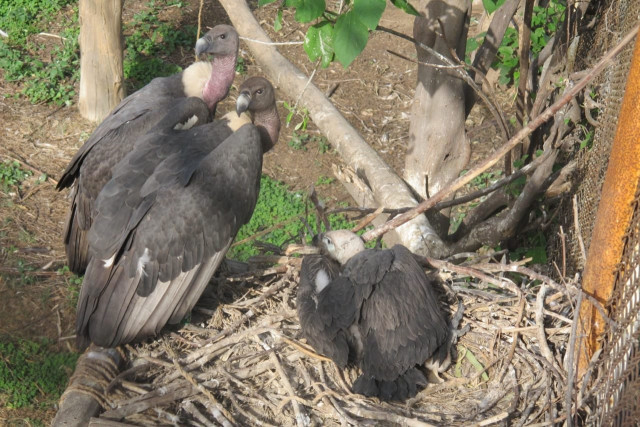Restoration of endangered vulture population remains at risk
Lack of safe zones for scavengers’ release may imperil decades’ worth of rehabilitation

It was with combined efforts of the wildlife conservation department and foreign NGOs, that the white-rumped vulture was brought back from the verge of extinction in Pakistan, some seven years ago. Yet however, the breed still looms close to endangerment, even after 16 years of continuous rehabilitative work, owing to lack of vulture-safe zones to release the newly-bred birds.
The breeding programme, that started with just two vultures in the year 2005 with the help of Worldwide Fund for Nature (WWF), had remained unsuccessful for the first decade or so, until 2015 when scavenger eggs could be artificially incubated. Now, the Vulture Restoration Centre in Changa Manga, is home to over 27 male and female birds responsible for propagating their species.
1640757384-3/WhatsApp-Image-2021-12-29-at-10-23-05-AM-(1)1640757384-3.jpeg)
PHOTO: EXPRESS
“The population of vultures started plummeting rapidly in the 1990s, primarily due to ingestion of livestock carcasses containing residues of hazardous cattle drugs. When ingested by vultures, the chemical would damage their kidneys and eventually lead to death of the bird,” said Punjab Wildlife Deputy Director Mian Hafeez, adding that lack of food and loss of habitat were also among factors significantly responsible for the decline in scavenger population.
Considering which, when joining the project in 2016, Punjab Wildlife had approved a fund of Rs93million to create an aviary for the endangered birds, in addition to contributing in machinery, staff and research labs to be introduced to the Changa Manga facility.
Per Jamshed Chaudhry, a representative of WWF who also heads the Vulture Restoration Project, vultures rehabilitated under the programme will be ready for release in the next two to three years, which is why the lack of vulture-safe zones in Punjab is a pressing concern at the moment. “Vulture-safe zones are essentially places with a lot of green coverage, where the use of cattle drugs is strictly prohibited so that the birds can easily nest and breed,” explained the WWF representative.
1640757383-1/WhatsApp-Image-2021-12-29-at-10-23-04-AM-(2)1640757383-1.jpeg)
PHOTO: EXPRESS
Addressing the matter, Punjab Wildlife Deputy Director said that they surveyed all districts of Punjab to scope suitable zones last year. Their team, upon visiting every tehsil learned that despite the ban, cattle drugs like Diclofenac are widely used across the province; leaving no space secure for the scavenging bird. “The wildlife department had banned the sale of Diclofenac in the 5ml pack. But the same chemical is also used for treatment of humans and is available as a 1ml injection at pharmacies. That is why many veterinarians continue inject many animals with injections used in humans,” he told.
Experts like Punjab Wildlife Board and WWF Advisory Council member Badar Munir, who consider the big bird to be nature’s sanitary workers, believe vultures also play a key role in controlling livestock infections like anthrax and tuberculosis by rapidly stripping the carcass and preventing sporulation of the disease. A shortfall in their number could hence affect livestock, which would eventually reflect in the human population.
1640757383-0/WhatsApp-Image-2021-12-29-at-10-23-04-AM-(1)1640757383-0.jpeg)
PHOTO: EXPRESS
So far, WWF’s partnership with the wildlife department, has significantly aided the local white-rumped vulture population, which until a few decades ago was the country’s prime candidate for extinction. The next step in the programme is to introduce these birds to the wild, but in absence of vulture-safe zones, the chances of the birds’ survival beyond the Changa Manga facility are too narrow to risk sabotaging the entire programme with an uncalculated release. Both Mian Hafeez and Jamshed Chaudhry are however hopeful that they will be able to create vulture-safe zones in the province, before the 11 scavengers born at the Changa Manga facility are ready for release.
Published in The Express Tribune, December 29th, 2021.

PHOTO: EXPRESS



















COMMENTS
Comments are moderated and generally will be posted if they are on-topic and not abusive.
For more information, please see our Comments FAQ